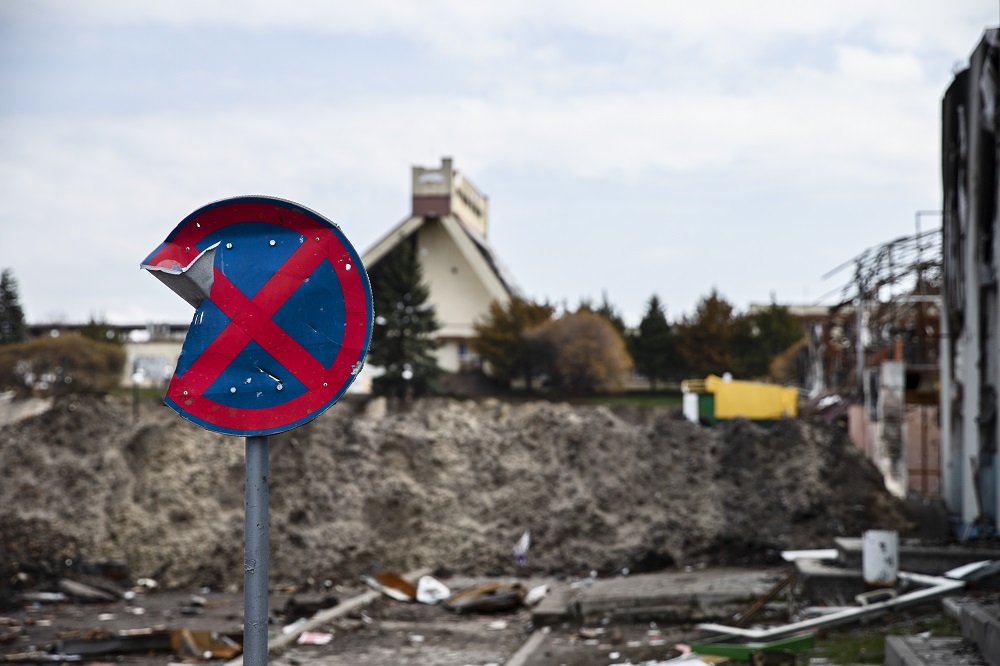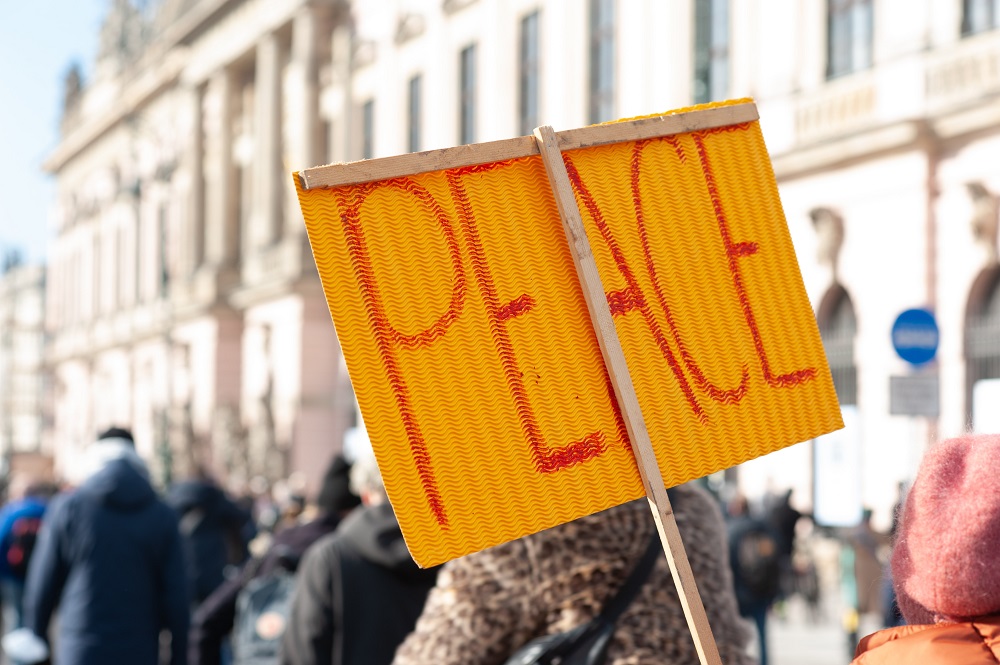The rising geopolitical risks have already led investors to lessen bets on how aggressively the Federal Reserve may tighten monetary policy to fight inflation. Western nations, including the United States and Britain, are concerned about the conflict and the fear of an imminent escalation leading to preparation for an invasion.
U.S. equities fell as U.S. President Joe Biden extended sanctions against Russia. The S&P 500 declined 1.8%, further pushing its losses from a January high to 10%. Treasuries extended losses, and the dollar changed a little. While the U.S. is weighing the potential damage from the sanctions targeting, the European Union and U.K. governments are signaling they are preparing to impose further penalties.
A full-blown military conflict fused with the Fed’s policy plans is likely to put a dent into expectations for economic growth. This worsening situation would also push oil prices up and make inflation worse and sticky.
Russian Stocks Swing Higher:
The Russian stock market whirled with Vladimir Putin’s decision to send troops into two separatist regions in Ukraine. After the Pentagon warned of a full-scale Russian invasion of Ukraine, the stock market plunged, with S&P 500 falling deeper into the territory. The whipsawing moves marked the most volatile two days of trading for Russian equities. The Moex index finished the main session 1.6 percent higher. Moscow’s main stock benchmark collapsed by more than a quarter despite a little recovery.
While the world was facing the ripple, state-owned firms in Russia were left unscathed.
- Shares in the state-owned energy group, Gazprom rose 7.6 percent.
- Tatneft advanced by about a tenth.
- Russian internet group V.K. added about 10 percent.
Weighing the impact of retaliatory western sanctions, investors are responding to the escalating problem and the growing possibility of causing triggering ripples in the market. Owing to the investors’ growing tensions, the turnover of stocks listed on the Moex index hit a record high of $7.7bn.
The Russian-Ukraine Tensions resulted in the following-
- S&P 500 fell 1.8%
- Nasdaq 100 fell 2.6%
- Dow Jones Industrial Average fell 1.4%
- MSCI World index fell 1.2%
- Stoxx Europe 600 Index rose 0.07% to 455.12.
- US Dollar Index fell 0.06% to 96.025

What does the crisis mean for markets?
While tension is rising, the current military move is creating crises about its potential impact on financial market equities and the global economy. The escalating conflict could prolong the turmoil in the markets, causing long-term consequences for investors.
- The conflict will likely contribute to extended short-term market volatility.
- Disruption of Russian energy exports could contribute to rises in global energy prices.
- Professional management may help US investors manage long-term international stock investing better.
What may occur in the short term?
The severity of the potential market and economic disruption depends on Russia’s actions. The conflict has the potential to take a variety of forms. Another factor that would leave an impact on the situation is how forcefully the US and Europe will respond with economic sanctions. Russia, in turn, will presumably react to these sanctions by restricting its energy exports, particularly natural gas.
Read more: Top AI Stocks to Watch Out for in 2022
Impact on Russian Market
Russian stocks are swinging higher, forcing investors to weigh the sanctions risks. Foreign-listed shares in Russian companies are also feeling intense selling pressure. Moscow index experienced the most volatile two trading days since the 2014 crisis. The MSCI index tracking Russian stocks trading in London and New York stumbles to about a fifth of its value. The imposition of sanctions against Russia is putting further stress showing signs of subdued inflation.
Investors have been considering the potential impact that will adversely aggravate inflation — owing to the surge in oil and natural gas prices. The Ukraine tension is snarling commodity supplies – placing further pressure on inflation – for everything from energy, wheat, to nickel.
- Gold prices have climbed
- Oil fluctuated
- Dollar was flat
- Treasury yields drifted at 1.92%
- Stoxx 600 Index fell by 2% before
- CBOE Volatility Index surged to its highest since late January
A pivotal question is whether the jump in raw material costs will stimulate more assertive policies?
The current tension between Russia and Ukraine is running the risk of aggravating the challenging inflation backdrop, while many investors and companies are anticipating for the situation to improve in the coming months of 2022. While some investors are staying optimistic, others believe this saga is far from over.
Economic impacts
The consequences of the conflict are likely to vary depending on geography. Europe would experience more negative impacts than other countries for energy. Western Europe, particularly Germany, will also feel the impact as it has no easy alternative source of energy to replace natural gas.
The Russia-Ukraine conflict will add uncertainty to the economic expansion in Europe as well as to the global markets. The US economy appears to be relatively insulated. But, for individual investors and consumers in the US, the effects would take a severe form adding to the pressures due to higher energy prices.
Impact on markets
From an investment viewpoint, the biggest impact will be the negative market sentiment on Russian stocks, currency, and bonds.
An upsurge in short-term stock market volatility is also being predicted. The situation could also drive-up prices of oil, natural gas, and other essential commodities at a duration when inflation is already a concern. The prevailing stock market volatility is also fueling uncertainty and disruption
Read more: 15 Top-Rated ESG Stocks to Consider in 2022
Key Takeaways:
- Amid the rising crisis between Russia and Ukraine, Stocks tanked: The Dow Jones Industrial Average fell by 1.4%, nearly 500 points, the S&P 500 lost 1%, and the tech-heavy Nasdaq 1.2%.
- The benchmark S&P 500 index fell more than 10% below its record highs earlier this year.
- Global stock markets suffered a hit after Russian President Vladimir Putin decided to recognize the separatist states of Donetsk and Luhansk in eastern Ukraine.
- The West widely criticized the movement, while the E.U. and the United Kingdom unveiled economic sanctions against Russia on as of writing this piece. The United States also unveiled sanctions targeting Russia’s sovereign debt.
- Russian troops moving into eastern Ukraine to keep the “peace” could be a not-so-subtle pretext for a full attack, warned many western officials.
- Oil prices surged, with Brent crude rising to $94 per barrel.
- Corporate earnings suffered a hit: Shares of Home Depot fell by 9%, Macy’s fell 5%. The rising geopolitical tensions lead to a drop in several markets.

Bottom Line
Risk assets such as stocks tend to relapse when geopolitical concerns dominate the headlines. While the crisis has lapped commodities markets globally, the economic fallout will likely remain modest.
The escalating tension between Russia & Ukraine and the stand-off has left investors scrutinizing shares at risk from potential sanctions against Russia. Investors are reacting emotionally to the aggressively tightening monetary policy in a bid to fight surging inflation. While the prevailing crisis is adding to the struggle of finding the right direction for stocks, the financial markets gain is leading to a clear response.
The rising tension and its consequences are being stated as a potentially massive shock for the world economy when the economy was just showing signs of thaw due to the pandemic-induced bottleneck pressures. Wall Street experts are alerting that if the Federal Reserve inflates rates too quickly, the situation could spark a sharp market disruption.
Considering the market situation in recent weeks, it can be inferred that the market fallout is likely to be short-lived. In this clout of uncertain market positions, rising inflation, and economic slowdown, a silver lining still prevails, which is paving the way to building a future of slow and supported growth.
With offices in New York, San Francisco, Austin, Seattle, London, Zurich, Pune, and Hyderabad, S.G. Analytics, a pioneer in Research and Analytics, offers tailor-made services to enterprises worldwide. A leader in Investment Research Services, S.G. Analytics focuses on providing services that enhance your organization’s investment decisions. Contact us today if you are looking to make critical data-driven decisions that stimulate accelerated growth and breakthrough performance.









